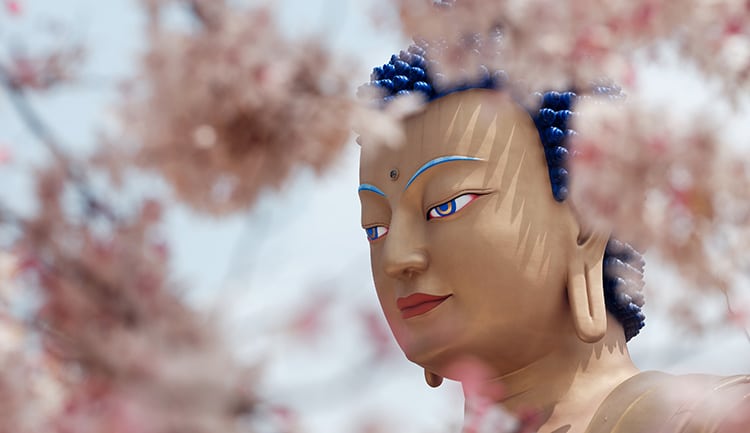The Four Qualities of a Wise and Open Heart
Category: Buddhist Path | Love & Compassion Meditation | Popular

What are the Four Immeasurables in Buddhism? — An Introduction
As meditators, we spend a lot of time practicing the art of presence. We develop the ability to observe our inner workings without getting caught up in judging or manipulating whatever arises in the mindstream. We also learn to use our mindful stability to investigate the mind and explore how it functions in a very direct way.
But that’s just part of the story. While meditation as an introspective discipline is clearly beneficial in and of itself, it really comes into its own when we can use the qualities we’ve developed on the cushion to inform and enhance the relationship we have with the world around us. That’s where the Four Immeasurables come in. They are the four great attributes of the wise and open heart—the essence of meditation in relationship.
What are the Four Immeasurables? They are qualities that can be developed by anyone with a resolutely kind heart. The term comes to us via Mahayana Buddhism, where the Four Immeasurables are presented as the four sublime or noble attitudes of the wise.
These are the limitless or immeasurable qualities of
- Lovingkindness: goodwill and friendliness towards all
- Compassion: the desire to relieve others’ suffering
- Sympathetic Joy: rejoicing in others’ happiness and well-being
- Equanimity: experiencing limitless benevolence towards all beings
Lovingkindness
In general, the quality of lovingkindness is an attitude of warm friendliness towards others: our great desire is to know that they are happy, safe, and content. In the right circumstances, this attitude comes easily to most of us. But our ability to express our warm-hearted nature is often impeded by other, conflicting tendencies. We want others to be happy, but our own happiness (and that of our loved ones) is our primary focus. We want others to be happy, but not Hilda next door who cut down our favorite tree and replaced it with a large purple plastic windmill. We want others to be happy, but there are limits.
Do there really have to be limits? How might we possibly come to recognize that the heart is, in fact, limitless? Meditation holds the key. First, our practice gives us insight into mind’s spacious, boundless essence. Second, there are specific practices, such as metta or lovingkindness meditation, that lead us to a direct experience of the beauty of the boundless heart. As Lama Jampa Thaye describes it, “It’s as if we’ve thrown a party and we’ve invited everybody.”
Compassion
Compassion picks up where lovingkindness leaves off. Recognizing that all beings experience discomfort, distress, and suffering at some point in their lives, we develop the wish to be able to relieve them of every obstacle to their happiness. We all want to be able to ease the pain and distress of those close to us and those whose plight touches us deeply. This wish becomes immeasurable or boundless when we can sincerely apply it to everyone, and this takes training.
Here again, meditation is invaluable as a basis for gaining perspective into our own likes, dislikes, needs, and challenges. Through meditation, we learn to relate to discomfort with less reactivity. And there are specific practices such as tonglen and karuna, or compassion, meditation which give us powerful tools that we can use to acknowledge and accept distress—our own and that of others—and transform it into the boundless, compassionate heart.
Joy
Sympathetic or appreciative joy has to do with feeling happy for others when things are going well for them. All too often, others’ good fortune triggers a response of rivalry or critique. With sympathetic joy, we rejoice when good things happen to others, especially when they are sowing the seeds of happiness to come.
As we meditate, we learn that we don’t have to judge or elaborate on the thoughts and feelings that arise during our practice and in our everyday lives. We have choices about what we do with our reactions. When we use this understanding to rejoice in the happiness and good fortune of everyone, including friends, foes, and those we would usually overlook, we find that there’s no limit to the delight we can experience: this is immeasurable joy.
Equanimity
Present in the other three Immeasurables, equanimity needs no introduction. It’s simply caring for and about every being with a tender, caring heart. Lama Jampa Thaye suggests that equanimity may be the best way to begin working with the Four Immeasurables. He says that the four are not linear, but “like a wheel where one pushes another forward.”
In meditation, equanimity translates as impartiality: pleasant thought or emotion, acknowledge it and let it go. Unpleasant thought or emotion, acknowledge it and let it go. Busy mind, nothing to do. Tranquil mind, nothing to do. And so on. We are open to working with whatever arises on an equal, impartial footing. And in the context of relationship, we use this ability to embrace a variety of experiences so that nothing and no one is excluded. This is the equanimity of the wise and open heart.
Rather than seeing them as an unattainable goal, we can use the Four Immeasurables as a practice in relationship. Mind Trainer Vinny Ferraro calls them The Four Heart Practices. In his article Opening the Heart to Love, he compares the four qualities of loving kindness, compassion, joy and equanimity to the four chambers of the heart. “These are four flavors of love that we’re training ourselves to respond with. Whatever comes up, we’ll be able to trust the heart’s response, when we get back into relationship with it.”








